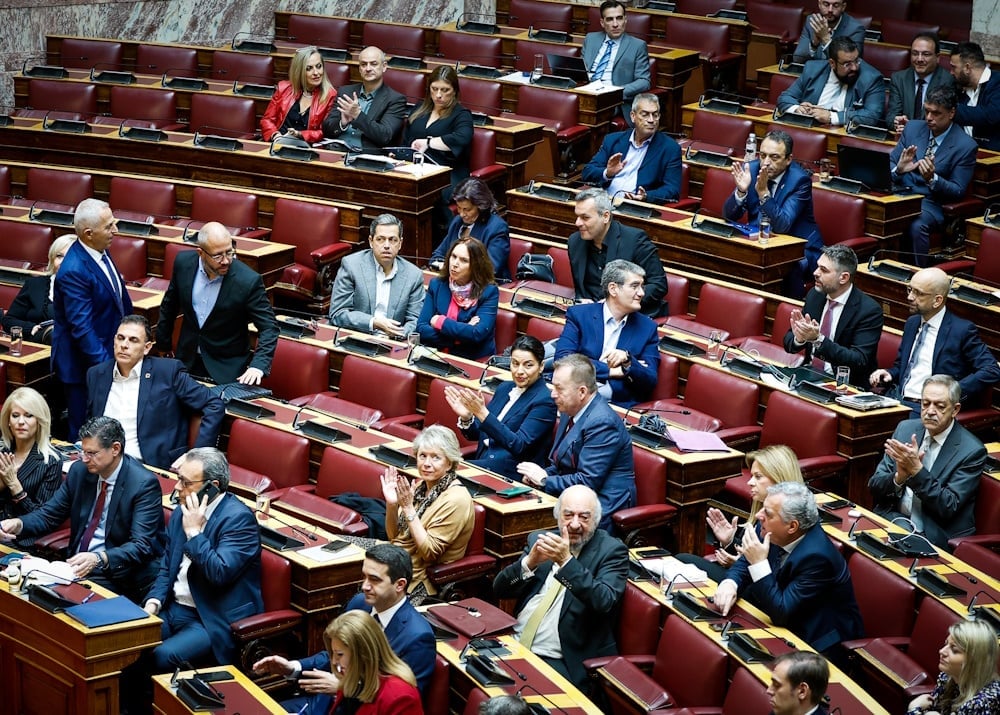After seismic elections, EU leaders assess damage
European Union leaders, stunned by a big Eurosceptic protest vote in European Parliament elections, agreed on Tuesday to seek a package deal of appointments to top EU jobs with an economic agenda to win back public confidence.

European Union leaders, stunned by a big Eurosceptic protest vote in European Parliament elections, agreed on Tuesday to seek a package deal of appointments to top EU jobs with an economic agenda to win back public confidence.
European Union leaders, stunned by a big Eurosceptic protest vote in European Parliament elections, agreed on Tuesday to seek a package deal of appointments to top EU jobs with an economic agenda to win back public confidence.
German Chancellor Angela Merkel, the 28-nation bloc’s most powerful leader, acknowledged that her centre-right party’s candidate, former Luxembourg prime minister Jean-Claude Juncker, may not end up heading the executive European Commission.
British Prime Minister David Cameron, under pressure after the anti-EU UK Independence Party won the European Parliament election in Britain, came to the EU summit in Brussels determined to block the nomination of Juncker, seen in London as an old-style European federalist.
Sweden, the Netherlands and Hungary also voiced reservations and the 28 leaders mandated European Council President Herman Van Rompuy, who chairs EU summits, to hold consultations on a slate of candidates for senior positions and a policy agenda for the next European Commission, Merkel told reporters.
The aim was to wrap up the contentious appointments before the summer break, she said. EU leaders next meet on June 26-27.
Merkel’s centre-right European People’s Party won the most seats in the 751-member EU legislature but no party has a clear majority. She paid lip service to Juncker’s candidacy for the top job but said other outcomes were possible.
“As a member of the EPP, I supported Jean-Claude Juncker as our candidate for the presidency of the Euroepan Commission and I haven’t forgotten that. But I still have to respect the treaty,» she told a news conference, rebuffing questions from German reporters about breaking her word to voters.
The Lisbon treaty governing the EU says leaders have to «take into account» the election results but does not specify that they have to nominate the so-called «Spitzenkandidat» of the biggest party as Commission president.
Asked whether she was willing to outvote Cameron, she said it was important to preserve the good working atmosphere of the European Council of EU leaders, especially in times of crisis.
With far-right, anti-EU parties sweeping to unprecedented victories in France, Britain and Denmark and populists gaining ground elsewhere, the leaders faced tough questions about the future direction of European integration.
Drawing initial lessons from a bruising election, which handed a quarter of all parliament seats to Eurosceptic or protest parties, several leaders said they would seek ways to reorient the EU’s work to make it more relevant to citizens.
“The first thing we have to do is to formulate an answer,» said Dutch Prime Minister Mark Rutte, whose liberal party came fourth, one place behind the anti-Islam Freedom Party, in the Netherlands.
“As far as I’m concerned, that answer contains fewer rules and less fuss from Europe, and focusing Europe on where it can add value to things,» he said.
Cameron, whose Conservatives were beaten into third place behind the triumphant UKIP and the Labour opposition, said the EU needed to reform itself radically,
“The European Union cannot just shrug off these results and carry on as before,» he said. «We need change. We need an approach that recognises that Europe should concentrate on what matters, on growth and jobs, and not try to do so much.”
Merkel, French President Francois Hollande and Italian Prime Minister Matteo Renzi all focussed on reviving the economy, but it remains to be seen if they can find common ground on how.
Hollande and Renzi want a softening of budget austerity to allow more public investment to boost growth. Merkel said it was essential to improve Europe’s competitiveness while maintaining fiscal discipline and creating conditions for investment.
The leaders also discussed the situation in Ukraine, pledging to support newly elected President Petro Poroshenko and warning Russia that they could still step up economic sanctions if it took further actions to destabilise Eastern Ukraine.
Merkel said Moscow had sent some positive signals since Poroshenko’s election on Sunday and it should act to seal its border with Ukraine to prevent any supplies reaching separatist rebels in the Russian-speaking east of the country.
Hollande, weakened by his Socialist party’s crushing defeat by the far-right National Front in the European election, joined Cameron’s call for the EU to step back from citizens’ lives.
“Europe has to listen to what happened in France,» he said. If the bloc were unable to revive growth and help create jobs for the unemployed, there would be even bigger votes against the EU in the years to come, he said.
Leaders agreed the next Commission would concentrate on boosting the competitiveness of EU economies while furthering development of Europe’s monetary union, a common energy and climate policy and a common foreign policy, Merkel said.
While Cameron is adamant that more powers should be returned to national capitals and wants the phrase «ever closer union» dropped from the EU’s treaty, treaty change is very unlikely.
Seeking to force the leaders’ hand, the heads of the main pro-European parliamentary groups met before the summit and mandated Juncker to lead talks to try to find a majority for his bid to head the Commission. Van Rompuy will consult with him.
The nominee must be approved by a majority in parliament. Some diplomats fear lawmakers could reject any candidate who did not stand in the parliament election, opening the way for a protracted period of institutional fighting.
ολες οι ειδησεις
- Επιβεβαίωσε η NASA: Το αντικείμενο που έπεσε σε σπίτι στη Φλόριντα προέρχονταν από τον Διεθνή Διαστημικό Σταθμό
- Σίδνεϊ: «Τρομοκρατική η επίθεση με μαχαίρι σε εκκλησία»
- ΤΣΣΚΑ Μόσχας: Ποιος Έλληνας προπονητής αναλαμβάνει την ρωσική ομάδα
- Χειροπέδες σε τέσσερις διαρρήκτες στη Θεσσαλονίκη – Έκλεβαν χρήματα και χρυσαφικά από σπίτια
Ακολουθήστε το Newpost.gr στο Google News και μάθετε πρώτοι όλες τις ειδήσεις
Δείτε όλες τις τελευταίες Ειδήσεις από την Ελλάδα και τον Κόσμο, στο Newpost.gr








